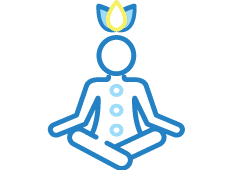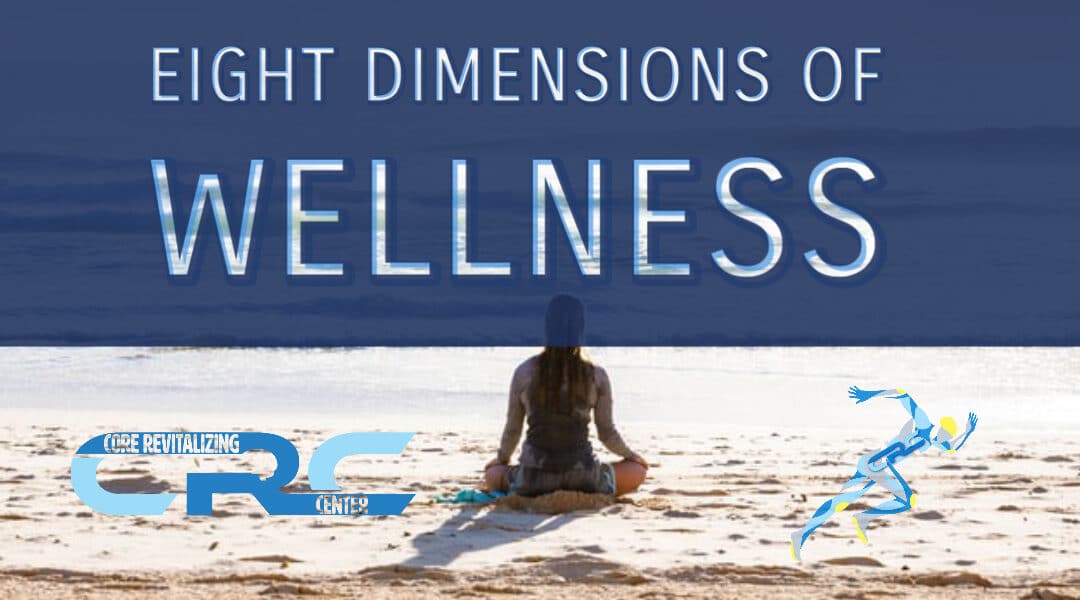Eight Dimensions of Wellness
CORE Eight Dimensions of Wellness Assessment
Wellness is not merely the absence of illness or distress – it is striving for positive physical, mental and social well-being. It is a lifelong process of making decisions that support a more balanced life to maximize your potential.
There are always opportunities for enhancing your wellness and it starts with self-reflection and setting goals.
Use the CORE Dimensions of Wellness Assessment tool to determine the areas of wellness (emotional, environmental, intellectual, occupational, physical, social, financial, and spiritual) where you are thriving, as well as those that may need greater attention.

Emotional
Emotional wellness is the ability to cope effectively with life and build satisfying relationships with others. It is not just how you handle your perceived stressors. Emotional wellness implies the ability to be aware of and accept our feelings, have an optimistic approach to life, and enjoy life despite occasional disappointments and frustrations.

Physical
Physical wellness is how you keep yourself in top condition. Overall physical wellness encourages the balance of physical activity, nutrition, mental well-being to keep your body in top condition. Optimal physical wellness is developed through a combination of beneficial physical activity/exercise and healthy eating habits. Elemental components of physical wellness include building muscular strength and endurance, cardiovascular strength and endurance and flexibility. Obtaining an optimal level of physical wellness allows you to nurture personal responsibility for your own health.

Social
Social wellness refers to the relationships you have and how you interact with others. It is your sense of connectedness and belonging. Social wellness involves building healthy, nurturing and supportive relationships as well as fostering a genuine connection with those around you. Social well-being involves using good communication skills, having meaningful relationships, respecting yourself and others, and creating a support system that includes family members and friends. Social wellness also includes balancing the unique needs of romantic relationships with other parts of your life.

Intellectual
Intellectual wellness is when you recognize your unique talents to be creative and you seek out ways to use your knowledge and skills. When you foster your intellectual wellness, you participate in activities that cultivate mental growth. Intellectual well-being is also discovering the potential to share your special gifts with others. Intellectual wellness can be developed through academics, cultural involvement, community involvement, and personal hobbies. As intellectual wellness develops, you are able to develop personal resources that work together with the other realms of wellness in order to achieve a more balanced life.

Financial
Financial wellness is the feeling of satisfaction with your financial situation. It involves the process of learning how to successfully manage financial expenses. Financial Finesse further defines financial wellness as a state of well-being where an individual has achieved minimal financial stress, established a strong financial foundation, and created an ongoing plan to help reach future financial goals. Finances are an obvious stressor for most people; often cited as the #1 reason for worry in Americans today. Therefore, being able to minimize anxiety about this aspect of your life can enhance your overall well-being.

Occupational
Occupational wellness is a sense of personal satisfaction and enrichment in one’s life through work. It is the ability to achieve a balance between work and leisure time, addressing workplace stress, and building relationships with co-workers. Because what we do for a living encompasses so much of our time, it’s important for our overall well-being to do what we love and love what we do. When people are doing what they were meant to do, they deepen their sense of meaning and purpose. The choice of profession, job satisfaction, career ambitions, and personal performance are all important components of your occupational well-being path’s terrain.

Environmental
Environmental wellness is related to the surroundings you occupy. Environmental wellness is often overlooked when designing a wellness plan. This dimension of health connects your overall well-being to the health of your environment. The core principle of environmental wellness is respect – respect for all nature and all species living in it. Environmental well-being includes trying to live in harmony with the Earth by understanding the impact of your interaction with nature and your personal environment and taking action to protect the world around you. Protecting yourself from environmental hazards and minimizing the negative impact of your behavior on the environment are also central elements.

Spiritual
Spiritual wellness is related to your values and beliefs that help you find meaning and purpose in your life. While different individuals may have different views of what spiritualism is, it is generally considered to be the search for meaning and purpose in human existence, leading one to strive for a state of harmony with oneself and others while working to balance inner needs with the rest of the world.


Recent Comments